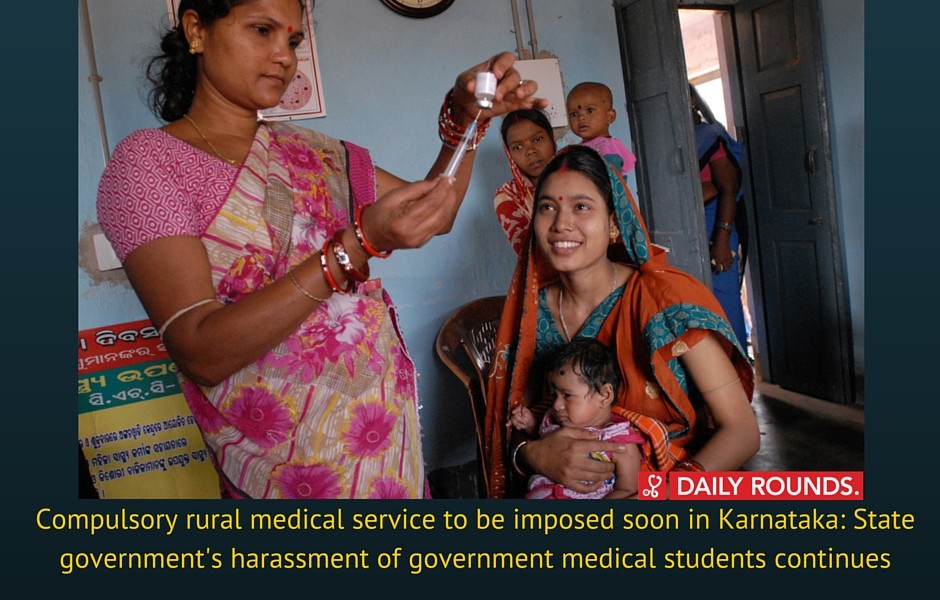
Compulsory rural medical service to be imposed soon in Karnataka: State government’s harassment of government medical students continues
The Karnataka state government continues to harass government medical students by looking to enforce the compulsory rural service act, officially known as the Karnataka Compulsory Service Training by Candidates Completed Medical Courses Act (2012). Some doctors are voicing their concern and saying that the act is a punishment students are facing for lapses in government’s planning and inability to cater to rural healthcare requirements.
Experts Weigh-in
Dr Srinivas Kakkilaya, a Mangaluru-based physician has called this move “a game plan to harass government medical students”. “If doctors are not there in the rural areas, it is not the fault of the young doctors who are studying. Why are they being punished for a crime that they never have been responsible for?” he asks.
Dr Kakkilaya also directly challenges the government’s claim on shortage of medical staff. “There is 50% shortage in nurses and 85% in paramedical staff. With this act the most brilliant students of the state will be sent to rural areas. The Medical Council of India and Centre have not taken a final decision on this issue. Kerala has already opted out, because the rural health is well manned there,” the doctor claims.
Dr Sadananda Nayak,an administrative medical officer at a Kodagu based PHC openly stated that working with a lack of or often missing infrastructure is very challenging. “There are many instances where I have assisted deliveries and conducted minor surgeries with no electricity. It is natural for patients to feel annoyed when we cannot deliver the expected care,” he said.
“Having doctors in rural sector has been always challenging across globe, and Karnataka is no exception,” says Sandeep Samethadka Nayak who is the founder president of World Health and Education Enrichment Links (WHEEL) and also a healthcare researcher at Chicago. “Acknowledging the mutual relationship between poverty and diseases, government should concentrate on cost effective and powerful tools like safe water, sanitation, nutrition, vaccination coverage, education, housing, roads and employment as the highest priority,” he said.
Community health care can be the key of success in the rural health care in India, believes Dr Abusaleh Shariff, public health economist and research scholar at US India Policy Institute, Washington DC. He also said, “India has achieved a lot with Asha workers and anganwadi schemes. Strengthening such community institutions and a planned paramedical team has proved to be very beneficial.”
Minister for Health and Family Welfare UT Khader said this scheme is for the benefit of rural patients and that students are in a way expected to perform this service because the government has been supporting their colleges. He observed that students are willing to pay the fine but have been unwilling to go to the rural areas to serve. . It is this trend that has pushed the government to make the rural posting mandatory. The first batch is expected to be out in November. All those who have passed out before the government notification was passed are exempted. The fresh graduates are being paid, they are not working free of cost. This is an opportunity for them to learn. The rural service has been made mandatory keeping in mind the rural patients and nothing else.
Compulsory Service
The Department of Health and Family Welfare decided to introduce compulsory service training for candidates in rural areas who have completed their MBBS course. The state government okayed the decision after the nod from the medical education department. With departments having already discussed the implmentation of this act, it is only a matter of time before it is implemented. The state government is hoping to solve the doctor shortage problem in the state, even as counselling sessions for the rural posting will be conducted at a district level. The government is making sure that no loopholes are in the act this time by putting a hefty fee on students who violate the act by not taking up the rural posting.
What it means for students
MBBS students who graduate this Novemeber across Karnataka then will have to figure out how to cope with the rural posting. With roughly two months till their graduation, medical students may very well look at doing some research in these rural areas to explain to the government that the actual shortage is with nurses and medical professionals, and not doctors. Another way to buy time would be by pointing out the lack of basic infrastructure in most rural PHCs. Overall, government medical students are in for a rough ride ahead if this act is imposed.
Original Post – Bangalore Mirror (Edited)
Enjoyed reading this news story? For richer medical discussions,case images, MCQs and cases download the DAILY ROUNDS app for FREE! at App Store or Play Store


